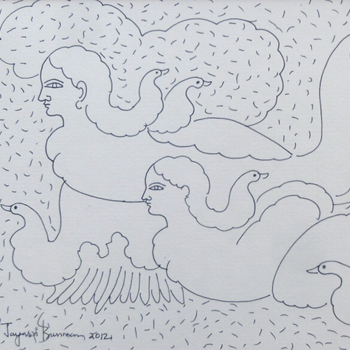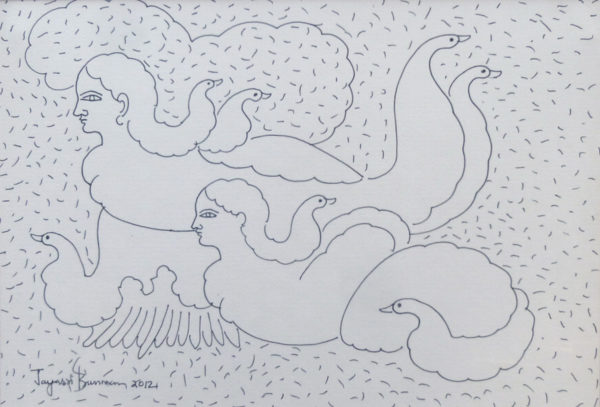
The imagery in Jayasri Burman‘s work has a dream-like and lyrical quality with a unique sensitivity which, although inspired by the Indian folk element, retains a quality of refreshing candour and reflective honesty, that is as original as it is endearing. She manages very successfully to weave the decorative and design element of the folk idiom into the intricate patterns of her canvas, without losing the natural charm and naivete of her work, which is uniquely her own.
Her concern for women is also evident in her work. Without calling herself feminist, she confesses her desire to see her women content in partaking in the bounties of life. Free, and at one with Nature, her woman is sometimes a coronated ceremonial bird, and at others, a mother Goddess or a creature of the woods.
Jayasri’s closeness to Nature is also reflected her in works. She can reinterpret the lush green environs, the hybridized imagery of a woman who is more bird-like in her grace and form, the stagnant pools that bring out the flamed colours of “Basant” (spring), in her paintings. Jayasri’s latest oeuvre reveals an unconscious suspended energy that can find its parallel in the environs of Santiniketan, where she studied. If she expressed a tranquil sanguine feel in the images she reflected two years ago, this time her vehicle of expression is the dance of colour.
It is not wrong to presume that Jayasri has gained a grace in her works, one that comes from the evolution of her maturity and her own contentment with life as it is. What she has gained then is born out of the opportunity to respond to the varied aspects of Indian culture- this then is a new world of Nature that has inspired the artist to cast her eye upon the paint.
One can also find here, the selection of certain key colours – red, blue or the radiant saffron – provides as a starting point and guide for content, colour and structure. The works are a commitment to an art that is derived from the experience of the landscape – it is more than a matter of seeing things afresh – it is the perception that is aware of the transience and mutability of landscape. She establishes an intimate space, like a secret garden, and invites the viewer to partake of it. Once you step into Jayasri’s fictional world, you can look around and respond immediately to the unorthodox canons of beauty and partake of the choreography of Nature.


